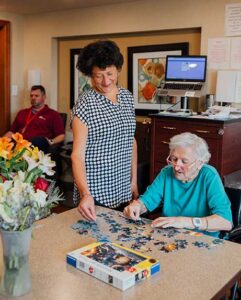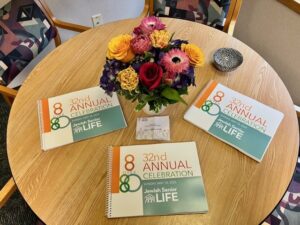June is Alzheimer’s and Brain Awareness Month
The significance of Alzheimer’s & Brain Awareness Month cannot be overstated. This month-long observance serves as a beacon, illuminating the often shadowy realms of Alzheimer’s and other forms of dementia, conditions that affect millions of people worldwide.
Alzheimer’s disease is a progressive disorder that causes brain cells to degenerate and die. It’s the most common cause of dementia, a continuous decline in thinking, behavioral and social skills that disrupts a person’s ability to function independently. Yet, despite its prevalence, there remains a cloud of misunderstanding and stigma surrounding Alzheimer’s and other forms of dementia.
Benefits of Alzheimer’s & Brain Awareness Month
This is where the importance of Alzheimer’s & Brain Awareness Month comes into play. It’s a time for us to shed light on these conditions, to educate the public about the realities of living with dementia and the impact it has not only on those diagnosed but also on their families and caregivers. It’s a time to dispel myths, to break down stigmas, and to foster a greater understanding and empathy among the general public.
Moreover, Alzheimer’s & Brain Awareness Month is a call to action. It’s a rallying cry for researchers, healthcare professionals, and policymakers to prioritize the fight against Alzheimer’s and other forms of dementia. It’s a reminder that we need more research, better treatments, and comprehensive support systems for those affected.

For our Jewish community, this month holds a particular significance. Recent research has identified a mutation in the NOTCH3 gene that is much more frequent in Ashkenazi Jews, and nearly all of the Alzheimer’s cases with this NOTCH3 mutation were of Ashkenazi descent.
Another study, just published this month, also showed that Ashkenazi Jews are more likely to suffer from Alzheimer’s.
This finding underscores the importance of Alzheimer’s awareness for the Jewish community. It’s a time for us to come together, to learn about our unique risks, and to support research efforts that could lead to better diagnostic and predictive tests for our specific population.
The Impact of Alzheimer’s & Brain Awareness Month
The impact of Brain Awareness Month extends beyond the individuals living with these conditions. It’s a time for communities to come together, to learn, to support, and to advocate. It’s a time when we can all contribute to a larger cause, whether by participating in local events, donating to research initiatives, or simply wearing purple in solidarity.
How You Can Support Alzheimer’s & Brain Awareness Month
There are several ways you as an individual can support Alzheimer’s & Brain Awareness Month:
- Educate Yourself and Others: Learn about Alzheimer’s disease and other forms of dementia. Understand the symptoms, the progression, and the impact these conditions have on individuals and their families. Share this knowledge with others to help dispel myths and reduce stigma.
- Wear Purple: Purple is the official color of Alzheimer’s awareness. By wearing purple, especially on June 21st, the longest day of the year, you can show your support and raise awareness.
- Share Personal Stories: If you or a loved one has been affected by Alzheimer’s or another form of dementia, consider sharing your story. Personal stories can help others understand the realities of these conditions and can provide comfort to those going through similar experiences.
- Donate: Consider making a donation to a reputable organization that supports Alzheimer’s research or provides resources for those affected by the disease. Every contribution, no matter how small, can make a difference.
- Volunteer: Many organizations need volunteers to help with various tasks, from assisting at events to providing support for individuals with Alzheimer’s and their families.
- Advocate: Contact your local and national representatives to advocate for policies that support Alzheimer’s research and provide resources for those affected by the disease.
- Participate in Events: Many communities and organizations host events during Alzheimer’s & Brain Awareness Month. These can include educational seminars, fundraising walks, or memory cafes for those with Alzheimer’s and their caregivers.
- Use Social Media: Use your social media platforms to raise awareness. This could involve sharing facts about Alzheimer’s, posting a photo of yourself wearing purple, or sharing a personal story. Use the hashtag #ENDALZ to join the wider conversation.
Remember, every action, no matter how small, can contribute to raising awareness and making a difference in the fight against Alzheimer’s and other forms of dementia.
Significance of Alzheimer’s & Brain Awareness Month
Alzheimer’s & Brain Awareness Month is a crucial observance that serves to educate, inspire, and mobilize. It’s a testament to the power of awareness and the difference we can make when we come together for a common cause. It’s a time to remember those living with Alzheimer’s and other forms of dementia, to honor their experiences, and to recommit ourselves to the fight for a world without Alzheimer’s.









